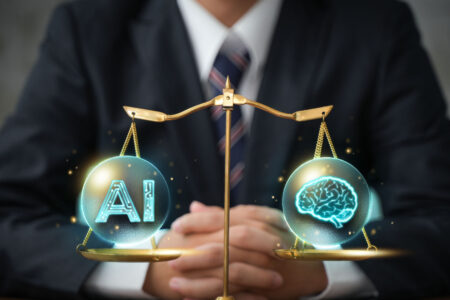
We’re used to treating information as “free,” but the price we pay for the illusion of “free” is only workable so long as most of the overall economy isn’t about information. Today, we can still think of information as the intangible enabler of communications, media, and software. But as technology advances in this century, our present intuition about the nature of information will be remembered as narrow and shortsighted. We can think of information narrowly only because sectors like manufacturing, energy, health care, and transportation aren’t yet particularly automated or ‘net-centric.
But eventually most productivity probably will become software-mediated. Software could be the final industrial revolution. It might subsume all the revolutions to come. This could start to happen, for instance, once cars and trucks are driven by software instead of human drivers, 3D printers magically turn out what had once been manufactured goods, automated heavy equipment finds and mines natural resources, and robot nurses handle the material aspects of caring for the elderly. (These and other examples will be explored in detail later on.) Maybe digital technology won’t advance enough in this century to dominate the economy, but it probably will.
Maybe technology will then make all the needs of life so inexpensive that it will be virtually free to live well, and no one will worry about money, jobs, wealth disparities, or planning for old age. I strongly doubt that neat picture would unfold.
Instead, if we go on as we are, we will probably enter into a period of hyper-unemployment, and the attendant political and social chaos. The outcome of chaos is unpredictable, and we shouldn’t rely on it to design our future.
The wise course is to consider in advance how we can live in the long term with a high degree of automation.
We’re setting up a situation where better technology in the long term just means more unemployment, or an eventual socialist backlash.
For years I have presented complaints about the way digital technology interfaces with people. I love the technology and doubly love the people; it’s the connection that’s out of whack. Naturally, I am often asked, “What would you do instead?” If the question is framed on a personal level, such as “Should I quit Facebook?” the answer is easy. You have to decide for yourself. I am not trying to be anyone’s guru.
On the level of economics, though, I ought to provide an answer. People are not just pointlessly diluting themselves on cultural, intellectual, and spiritual levels by fawning over digital superhuman phenomena that don’t necessarily exist. There is also a material cost.
People are gradually making themselves poorer than they need to be. We’re setting up a situation where better technology in the long term just means more unemployment, or an eventual socialist backlash. Instead, we should seek a future where more people will do well, without losing liberty, even as technology gets much, much better.
Popular digital designs do not treat people as being “special enough.” People are treated as small elements in a bigger information machine, when in fact people are the only sources or destinations of information, or indeed of any meaning to the machine at all. My goal is to portray an alternate future in which people are treated appropriately as being special.
How? Pay people for information gleaned from them if that information turns out to be valuable. If observation of you yields data that makes it easier for a robot to seem like a natural conversationalist, or for a political campaign to target voters with its message, then you ought to be owed money for the use of that valuable data. It wouldn’t exist without you, after all. This is such a simple starting point that I find it credible, and I hope to persuade you about that as well.
The idea that mankind’s information should be made free is idealistic, and understandably popular, but information wouldn’t need to be free if no one were impoverished. As software and networks become more and more important, we can either be moving toward free information in the midst of insecurity for almost everyone, or toward paid information with a stronger middle class than ever before. The former might seem more ideal in the abstract, but the latter is the more realistic path to lasting democracy and dignity.
An amazing number of people offer an amazing amount of value over networks. But the lion’s share of wealth now flows to those who aggregate and route those offerings, rather than those who provide the “raw materials.” A new kind of middle class, and a more genuine, growing information economy, could come about if we could break out of the “free information” idea and into a universal micropayment system. We might even be able to strengthen individual liberty and self-determination even when the machines get very good.
This is a book about futuristic economics, but it’s really about how we can remain human beings as our machines become so sophisticated that we can perceive them as autonomous. It is a work of nonnarrative science fiction, or what could be called speculative advocacy. I’ll argue that the particular way we’re reorganizing our world around digital networks is not sustainable, and that there is at least one alternative that is more likely to be sustainable…
The blindness of our standards of accounting to all that value is gradually breaking capitalism.
As you read this, thousands of remote computers are refining secret models of who you are. What is so interesting about you that you’re worth spying on?
The cloud is driven by statistics, and even in the worst individual cases of personal ignorance, dullness, idleness, or irrelevance, every person is constantly feeding data into the cloud these days. The value of such information could be treated as genuine, but it is not. Instead, the blindness of our standards of accounting to all that value is gradually breaking capitalism.
There is no long-term difference between an ordinary person and a skilled person in this scheme. For now, many kinds of skilled people do well in a software-mediated world, but if things don’t change, those who own the top machines will gradually emerge as the only elite left standing. To explain why, consider how advancing technology could do to surgery what it has already done to recorded music.
Musical recording was a mechanical process until it wasn’t, and became a network service. At one time, a factory stamped out musical discs and trucks delivered them to retail stores where salespeople sold them. While that system has not been entirely destroyed, it is certainly more common to simply receive music instantly over a network. There used to be a substantial middle-class population supported by the recording industry, but no more. The principal beneficiaries of the digital music business are the operators of network services that mostly give away the music in exchange for gathering data to improve those dossiers and software models of each person.
The same thing could happen to surgery. Nanorobots, holographic radiation, or just plain old robots using endoscopes might someday perform heart surgery. These gadgets would perform the economic role that MP3 players and smartphones took on in music delivery. Whatever the details, surgery would then be reconceived as an information service. The role of human surgeons in that case is not predetermined, however. They will remain essential, for the technology will rely on data that has to come from people, but it isn’t decided yet if they’ll be valued in terms that lead to wealth.
Nonspecialist doctors have already lost a degree of self-determination because they didn’t seize the centers of the networks that have arisen to mediate medicine. Insurance and pharmaceutical concerns, hospital chains, and various other savvy network climbers were paying better attention. No one, not even a heart surgeon, should pretend to be indefinitely immune to this pattern.
There will always be humans, lots of them, who provide the data that makes the networked realization of any technology better and cheaper. This book will propose an alternative, sustainable system that will continue to honor and reward those humans, no matter how advanced technology becomes. If we continue on the present path, benefits will instead flow mostly to the tenders of the top computers that route data about surgery, essentially by spying on doctors and patients.
This excerpt is taken from Who Owns the Future? Copyright © 2013 by Jaron Lanier. Reprinted by permission of Simon & Schuster, Inc.
Photo: Joyseulay / Shutterstock






